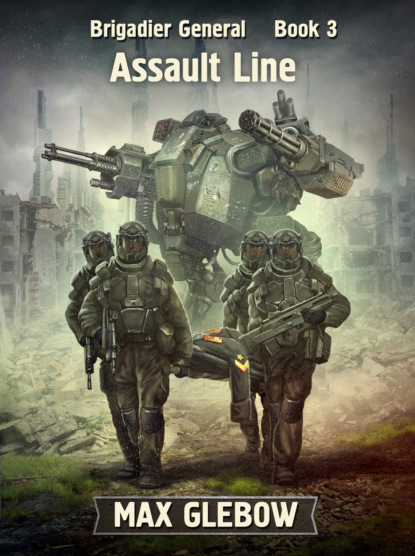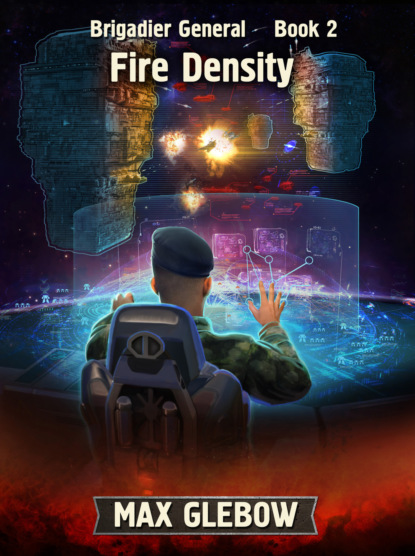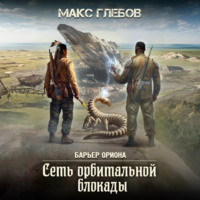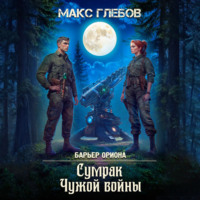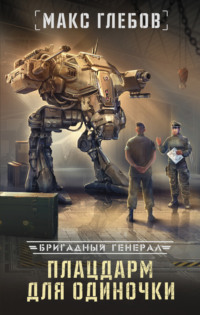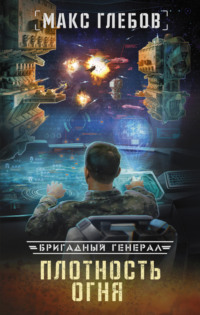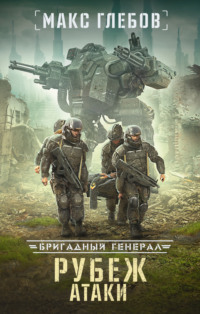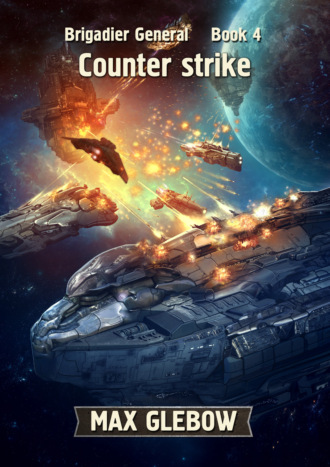
Полная версия
Counter strike
Barrington did not create unbearable living conditions for the captured enemies. The standard artificial sun has warmed the planet with its gentle thermonuclear rays, the gravitational corrector has normalized the gravitational force, atmospheric generators wrapped the stone ball in an air coat, and then… Barrington then handed it over to the quargs themselves. Humans brought to the planet food for the nearest future, mining equipment for the development of scattered deposits, modular structures for housing construction and public buildings and a minimally needed set of industrial blocks to build the city’s primary infrastructure. The new residents of the colony have been told a very simple rule of life: you give us Americium, and we give you everything you ask, well, except… you know…
That was a very productive idea. Among other things, it made it possible to observe the quargs in the natural, so to say, conditions of existence. Security didn’t go on the planet, humans could only be found at a few locations where the quargs could exchange for Americium the goods they needed. Other than that, the prisoners managed on their own. They quickly created some kind of settlement with their administration and even the police, as crime among them was as common as among people.
Three years later, it became clear that the model had worked. The quarg police were even allowed to purchase hand-held weapons and order light armored suits. This step was taken after several major clashes between criminal elements and forces of order were observed from orbit, and those clashes led to mass fights in which the police had no advantage over criminals. Barrington decided that it was easier to arm the quargs themselves with light weapons than to take charge of maintaining order in the colony, and he was quite right. In any event, there were no further major disturbances.
And now Lit-ta and I have arrived at this colony. To Kruger 60 we were delivered by cruiser Moscow, kindly assigned to me from the Fifth Strike Fleet by Admiral Nelson. The lizards’ leader brought along five of the congeners who were in charge of the science and engineering part of the operation, I understand.
“Igorrr,” told me Lit-ta, “It isss highly desirrrable that the quarrrg you brrring me have lived here forrr about ten yearsss. If he diesss, it doesn’t matter, the block in his brrrain will kill him sssoon enough.”
“Why is it so?”
“We don’t know. Maybe the block needsss to be updated perrriodically, otherwissse it’sss killing the host. But we don’t know why they did it.”
“Lit-ta, how long does it take your assistants to grow a cocoon to remove the block?”
“About three hourrrsss.”
“In that time, I will select ten candidates. We’ll get them all to the cruiser together and politely explain that we want to do a full medical diagnostic of their organisms to try and figure out the causes of their deaths in captivity. Many of them have already undergone such procedures. They usually acquiesce in silence and tolerate tests. This time, we’re going to put them in a full diagnostic capsule designed specifically for their bodies. The first five prisoners will undergo the normal procedure in front of each other. They’ll see another patient lie in the capsule, it closes and after a while releases it back alive and well. Except the capsules will be different all the time, and in the fifth capsule, instead of our stuffing, there will be your cocoon. Your men… I’m sorry, but what do I call you to make you comfortable?”
“You can sssay «yourrr lizzzarrrdsss». Sssoundsss good, we apprrreciate,” responded Lit-ta, showing me her split tongue.
“Great. So, can your lizards make it to be as close as possible to the inside of our capsules?”
“That’sss trrricky, but we have to trrry. Otherwissse, it’sss not gonna work.”
“The main thing is that there’s a resemblance. When the outer shell of the capsule is closed, the light will go out, and then do whatever you want, but without any sudden movement.”
“We need accessss to the occipital part of their skull and to the ssspine. There will be attached ssseveral…” Litta thought, looking for a word, “prrrobesss, most likely. They’re sssuch sssoft extensionsss.”
“Very well. We have a lot of stuff in the capsules, too, and these things touch the head and the back during the examination. We’ll just make special holes for your probes, and leave the rest of the capsule inside as it was. There won’t be seen any difference. ”
“I’m ssstarrrting,” Lit-ta nodded in a perfectly human motion and turned to her aides.
* * *The first five quargs passed the standard procedure of examination impassively as usual. They were used to comply with the orders of people, knowing that no one is intentionally harming them, but if they resist, there can be complications.
The sixth prisoner, who looked very similar, like all of them, to a zombie from the grave, but neat and moving normally, unlike this popular horror hero, calmly approached the capsule indicated to him and stepped into the niche behind the doors slid open. The doors closed, and the capsule slowly took up a horizontal position. Nothing unusual happened for five minutes, and then the capsule shook, and the medical diagnostic devices that we didn’t dismantle to provide the procedure some extra credibility gave us a warning.
We urgently stopped the process of «examination», but it was too late, the prisoner died.
“It’sss a classsic death when a block goesss off,” said Lit-ta behind my back, “We haven’t considered sssomething, Igorrr. We have to trrry again.”
Our attempts cost the lives of three more quargs. We changed the terms each time. We’ve even made a complete analogue of lizard cocoon probes from our terrestrial polymer materials and we did a «checkup» of another prisoner first on this simulator. He survived, but when he tried to repeat the procedure with a real cocoon, he died, just like all the others. The only condition we knowingly did not change was the length of the quargs’ captivity. Neither I nor Lit-tа wanted to experiment with prisoners who still have a few years to live. I mean, they’re enemies, but right now, they’re not dangerous and they’re perfectly law-abiding, so it’s better to risk those who are about to die, ’cause if our method works, they’ll have a chance at a normal life for years to come.
“We’rrre making a little bit of a missstake sssomewherrre,” told me Lit-ta while making nervous movements with the tail from which the cruiser officers tried to stay away. ’Cause trampling a high-ranking ally’s tail is, you know, not so good, it’s fraught with diplomatic complications.
“In the latter cassse, we werrre closssest to the target. The block was about to disssintegrrrate, but that’s when the death orrrder went off.”
“Do they feel anything when the block starts to disintegrate?”
“We don’t know. Anyway, it’sss a very sssubtle feeling, almost imperrrccceptible.”
“Can we dull it with something? Like pain?”
“Only the pain ssshould not be too sssevere. I need the patient’sss clearrr consciousssnesss.”
“The pain won’t be strong, but it’ll be throbbing in a jagged rhythm, distracting.”
“Okay. Let’sss trrry it.”
This time our legend for the quargs has changed. We didn’t talk about checkups to find a way to prevent their sudden deaths in captivity, it could put patients on their guard and make them subconsciously listen to life-threatening feelings. We told another batch of test subjects that we’re selecting candidates for resettlement in another colony where living standards are higher, but health requirements are stricter, because the hard work there required certain physique. The prisoners were not very enthusiastic about this information, because they knew that they had at best a few months left to live and that there was no point in changing anything in life, but they agreed to be examined without objection, as a matter of habit, even when we gave them honest warning that there might be pain.
A sixth prisoner entered the capsule as in all previous trials. The first test we did with the dummy probes in order the quarg to get used to the sensations and not twitch. Then the session was repeated with real probes released by the cocoon of lizards. In the fifth minute, the medical complex triggered the alarm, but not in the way it did when a patient died. The quarg was bad, very bad and painful, but he didn’t die, and the resuscitation module, which was automatically activated, called out for help from people, because it couldn’t decide what to do in an unfamiliar situation.
The prisoner survived.
Chapter 2
“The block was rrremoved,” informed me Lit-ta, “but the memorrry isss damaged. There’sss no telling what he’ll rrrememberrr, but what’sss left of it, we’ll get it out of him without killing him. We mussst continue with the other prrrisonerrrsss, Rrrearrr Admirrral, time is rrrunning out.”
Time. It really doesn’t like to wait. But our success has not yet been impressive. We’ve only been able to remove a block from every third quarg, the rest died immediately or went into a coma and died a few hours later. Of course, it was still a breakthrough. The Ministry of Defence Security Service, after listening to my report, became ecstatic and rushed to the Kruger 60 system. They now had a lot of work to do, and a job that was very promising in terms of concrete results and beneficial to their career development.
We fought for patient survival. I never thought that deaths of quargs might be upsetting to me, but they grieved me. The surviving prisoners, who no longer had a block, had not yet realized the changes that had taken place. In any case, they continued to ignore our questions on previously closed subjects, but I think it was purely out of habit. We haven’t addressed this problem seriously yet, waiting for the professionals from the Solar System.
One of the cruiser’s medical staff suggested we try injecting the quargs before the procedure with various medications, that do not cloud the mind, but suppress individual reactions of the body to external stimuli. The idea seemed interesting to us, and we started with anxiolytics, substances that dispel anxiety and fear. It went better right away. The full range of measures, including the application of drugs, the refined legend and demonstrative successful «examinations» of several other quargs and the patient himself before the beginning of the real procedure, increased the survivability of removing the block to 60 percent. But the real breakthrough was the use of several neuroleptics, which were chosen with regard to the characteristics of the quarg organism.
These substances were originally intended to control psychosis and behavioral disorders such as increased aggressiveness and mania, but we used them to delay the patient’s death order from the brain block for at least a few seconds. As it turned out, this delay was enough to prevent such an order from being generated before the block disintegrated.
Survival rates have risen to almost 100 per cent, and memory damage has been greatly reduced, but it has not been completely avoided, and Lit-ta regretted that it was likely to be unavoidable in the future.
“That’sss it, Igorrr, I did what I promisssed,” said Lit-ta after another successful removal of block, “My ssstaff will ssstay here with you and work as long as it takesss, and I have to fly.”
“Aren’t you curious to know what the prisoners without the blocks will say?”
“It’sss interesssting, of courssse it’sss interesssting,” I was shown the tongue again, “but my lizzzarrrds will tell me. It’s time to go, Rrrearrr Admirrral.”
“It’ll take you half the time to get back there. We placed a chain of hyperbeacons between the endpoints, and our latest technologies allow us to do longer jumps with them. It’s gonna take less accelerations and less pauses.”
“Fine. I’m waiting forrr you to pay me a visit, Igorrr. I have sssomething to ssshow you in my sssystem. Rrrememberrr, you’rrre welcome to any lizzzarrrd now. Our sssuperior leaderrr has confirmed your ssstatusss.”
“That’s for certain, Lit-ta, at the very first opportunity. I have one last question. You gave a very impressive speech in your meeting with the Federation President. I liked the way you treated our relationship after the victory. I want a lasting peace, too, for personal reasons of late, as well,” I smiled. Lit-ta already quite understood why I’m making up faces and showing her my teeth, “and I want to offer you an idea that I think will help.”
“Lissstening with great interrressst,” Lit-ta tilted her head to the side, which meant increased attention to the words of the interlocutor.
“Our paths of development are too different. Technologies are very different, they are so different that it’s going to be very difficult for us to take them from each other. But that’s a good thing, it’ll make us work together and depend on each other. Isn’t it a unifying factor?”
“Sssoundsss rrreasssonable. What’sss next?”
“Next, I’d like to suggest to create a fleet of ships based on a mixture of our technologies. At first, of course, it’ll be rough stuff, but we need to learn to combine our technologies and get them to work together, and, very importantly, ships should have mixed crews. People will be responsible for their share of the equipment, and lizards for their own.”
“We can considerrr it,” Lit-ta nodded her head, “I’ll passss it on to the sssuperior leaderrr…”
“I guess I didn’t explain it very well,” said I, “it’s not an abstract idea for the future. I want to start right now. I need a perfect reconnaissance ship. I was very impressed with your engines. They’re weaker than our engines, but when they’re working they’re not lowering the ship’s camouflage, which is more than important to a recon ship. I want to prepare a ship with a hybrid propulsion system, more simply, with two engines, yours and ours. Why do you think I asked you to work with the quarg prisoners? I needed information. I wanted to know where the enemy was holding the captured humans and lizards and what they were doing to them. One way or another, I’m gonna get that information out of them, and then I’ll need a ship on which I can get to the right points in the quarg rear without being spotted, and find out everything in detail. Lit-ta, I do not know about you, but we, humans, have lost nearly ten billion prisoners in 20 years of war, if you count not only the soldiers, but also the civilian population of the conquered planets. If any of them are alive, I want them out of there.”
“You want to smuggle billionsss of people and about as many lizzzarrrdsss out of the quarrrg rrrear? But that’s impossible…”
“I know a general… I’ll introduce you someday. Now, he can do almost anything in terms of cargo and passenger transportation, as well as supplying troops with everything they need. You may not believe this, but I don’t know the problems in this area that this man can’t solve within a reasonable time frame.”
“I think I’ll ssstick around forrr a few more daysss,” said Lit-ta after a small pause, “Your people will benefit from my help in extracting the information we need from our captive enemies. And… my ship. I’ll leave it to you, Rrrearrr Admirrral, along with the crrrew and my ssspecialistsss who repaired your crrruiserrr. I’m sssurrre you’ll be able to give me comforrrt aboard yourrr ssship when I go home.”
* * *The assistant entered the President’s office as always without a sound.
“Ignat, when will the full English report be ready?” asked Tobolsky.
“Work is still going on, Mr President,” replied the assistant in low voice, “Too much material fell into the hands of our operatives.”
“Tell them I’m not happy with the speed of the work.”
“There aren’t enough people with the right security clearance, Mr President, There’s a lot of information, and it’s never clear in advance what it’s level of secrecy is.”
“Anything important found yet?”
“Nothing to respond immediately. But… there’s information on Rear Admiral Lavroff. It’s very ambiguous.”
“More specifically?”
“It’s a report of an illegal investigation that spanned almost his entire life. Most of the data is obtained by illegal means, but we have to admit, this is the work of high quality, both operational and analytical.”
“Did something come up that we didn’t know before?”
“Yes and no, Mr President. The basic facts were known to us, but this report contains details that raise difficult questions. In addition, these materials contain the results of an analysis of Lavroff’s behaviour made by highly qualified psychoanalysts. Their conclusions sound fantastic, but they seem well founded.”
“What do they say?”
“You should see this document in person, Mr President,” said the assistant while sending the file to Tobolsky, “I am not an expert in this matter and I do not wish to distort the substance of the information that we have in our hands.”
For about ten minutes Tobolsky carefully examined the file, then looked up at the assistant.
“The information is classified by level A-O. Lavroff is not touched, I will decide what to do with it.”
“Mr President, don’t you think it’s dangerous to leave Rear Admiral Lavroff with the powers he has now?” The assistant was allowed to ask such questions, moreover, Tobolsky appreciated Ignat for the ability to ask them at the right moment.
“I don’t think so, Ignat. Even if Lavrov is not who we thought he was, he’s not the enemy. This man has already done so much for the Federation that it is foolish to suspect him of harboring any hostile agenda. Had it not been for his actions, I do not even know what the situation on the fronts would be.”
“Such analysis has been carried out, Mr President. Which is why I didn’t report this investigation to you immediately, and I was going to hand it over as part of the final report.”
“And what stopped you?”
“Analysis showed that if Lavroff did not exist, the Solar System would have been captured by the quargs eight months ago.”
* * *I escorted Lit-ta to the cabin specially equipped for her aboard battleship Bangui. The guest of honor was to be brought home with maximum comfort and in the shortest possible time, and two more battleships, an aircraft carrier, a dozen destroyers and three «Invisibles» were assigned as escorts. No one wanted to lose such a valuable ally to the Federation because of some stray squadron of quargs.
“Admirrral,” said Lit-ta in the doorway, showing me her split tongue and sort of accidentally promoting me, “Our sssuperrrior leaderrr loved the idea of a fleet of hybrrrid ssshipsss with mixed crrrewsss. Contact me thrrrough your beaconsss, and I’ll sssend you the expertsss and everrrything you need to grow our ssshipsss.”
Lit-ta flew home, and I went back to Earth, where Jeff and Professor Stein were waiting for me. They just couldn’t wait to dig into the lizard technique. I’ve given them the task of creating a hybrid reconnaissance ship from Kruger 60, as soon as I heard from security specialists that the information I needed was starting to be collected in their database.
The heads of the captive quargs whom we managed to remove the block were a complete mess. The craftsman who twisted their brains out knew his business. The most important information to us has been destroyed in the quargs’ memory in the first place. They didn’t get senile or become something like a vegetable. The functions of the brain, which are responsible for everyday activities, have not been disrupted. Short-term memory also functioned well, but in long-term memory, it was as if a tornado had passed through, not tearing everything down, but selectively destroying what was needed.
But there was something left, the process of information self-destruction did not always get started in time to get to the end.
It seems that information about the captured humans and the lizards was considered important enough by the block developer, moreover, this information was not available to all prisoners. But when we successfully removed over a thousand blocks, and the security officers were already struggling to move with fatigue, constantly interrogating more prisoners, something started to emerge.
“Rear Admiral, Sir,” Major Karjalainen has contacted me via hypercommunication, it was the same officer from the Department of Defense Internal Security who was investigating the trap that was set up for us by Global Weapon Industries’ lobbyists during the Gliese 338 operation. He was a Senior Lieutenant at the time, but apparently that investigation helped his career.
“I’ve been ordered to send you an information packet on the possible locations of the prisoners and lizards in the quarg rear,” my tablet vibrated announcing the receipt of the file, “As a direct participant in the interrogation of prisoners, I may add that the information is incomplete and quite contradictory,” continued Karjalainen, “It appeared that they were places of temporary detention, but they had been in operation for many years. What’s going on out there, none of the prisoners know or remember because of the memory loss.”
“Thank you, Major, you’ve been very helpful, tell me how the quargs have behaved after the removal of the block?”
“They behave very differently, Rear Admiral, Sir. Some of them don’t talk, and then we have to use chemicals. Others speak for themselves, sometimes without even waiting for questions. There have been four cases in which the quargs have volunteered to help us and have expressed their willingness to cooperate if this would help to remove the blocks of other prisoners.”
“Who gave them these blocks?”
“Their authorities. This is done in special centres, which are quite numerous throughout the territory of the quargs. The block needs to be renewed every ten years, otherwise it kills the host. They told me why it was done. If a quarg deviates from the correct behavior, the blocks of such a quarg and his whole family are not renewed. Surrender is also considered to be a deviation, with all the consequences, if it becomes known. Therefore, quargs surrender only when they realize that the information will not reach their superiors.”
“The blocks are for ordinary quargs only?”
“No. All the prisoners have them, and many of them are officers, but they’re not above the average of a major.”
“Thank you, Major, I look forward to the completion of your work.”
“Rear Admiral, Sir, if we learn anything of real importance, I will contact you immediately. The order to keep you informed comes directly from our Chief.”
* * *As we flew to Earth, I had time to think about the situation. A lot of things have happened recently, so it was clearly necessary to think them over carefully. Despite the seemingly good overall picture, I didn’t feel comfortable. There’s been too many unknowns in this equation called the war on the quargs.
I tried to analyze what was most haunting me. First of all, I didn’t like the calm on the front lines. There were no preconditions for it. Of course, our encounter with the lizards and the collapse of the quargs’ capture of another star system of reptiles could not be pleasant news for the enemy, but these events were not catastrophic for the quargs, at least in the short term.
Our recon ships have been snooping around the outskirts of the quarg rear systems, not too afraid of the mass detectors that the enemy has been actively using in recent months to defend their possessions against the sudden attacks of our ships. The recon ships could feel relatively secure, as the mass detector network could only detect ships larger than the destroyer. However, our intelligence has seen nothing extraordinary. Although the scouts did not venture into the central parts of the star systems because they were patrolled too tightly, and unmanned reconnaissance probes, even those launched from a long distance, were usually intercepted by the quargs before they could gather and transmit the necessary information.
Every day, I grew confident that the enemy was preparing something big and unexpected that could make us all very sick.
The second thing that was of no less concern to me was our failure in the Delta Trianguli system. I am not saying that we failed, but we did not achieve the planned result. The quargs have found truly effective means to combat the drone torpedoes. Of course, the torpedoes remained a formidable weapon, but they could no longer give us a decisive advantage, because too many of them were destroyed as a result of employment of unmanned scanner networks and the massive use of pursuit planes to shield heavy ships from a torpedo strike. And the enemy battleships and cruisers themselves have become different. The density of anti-aircraft weapons tripled, making heavy enemy ships difficult targets for torpedoes. It was time to bring something new to the stage that could make up for the shortfall seen in the number of battleships in the Federation Fleet, especially those like Titan. We have not yet learned how to build such ships. In this regard, I had some hopes for cooperation with the lizards, but we haven’t even started it yet, and the fleet desperately needed to replenish the heavy ships now, already yesterday.



